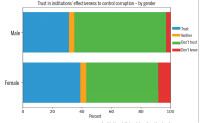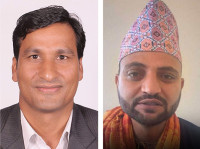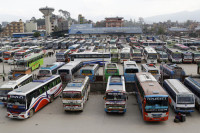National
Govt launches cancer registry across nation
The Nepal Health Research Council (NHRC) has launched the population-based cancer registry (PBCR) in a bid to collect data of cancer patients across the country.
The Nepal Health Research Council (NHRC) has launched the population-based cancer registry (PBCR) in a bid to collect data of cancer patients across the country.
While such registry has already been in use in seven hospitals, including Bhaktapur Cancer Hospital, Bhaktapur and BP Koirala Memorial Cancer Hospital (BPKMCH), Chitwan, the Ministry of Health is planning to expand it in all health facilities.
“With this registry, we will be able to understand the real burden of cancer patients in the country. With data in hand, we can also plan more effectively and set our priorities right,” said Dr Anjani Kumar Jha, the council chair. “In the first phase of the programme, we will introduce the registry in health facilities inside Kathmandu, Lalitpur and Bhaktapur. Then we will expand it across the country.”
Experts say that the PBCR will help collect and classify information on all cancer cases in order to produce statistics on the occurrence in define populations. The population-based registry will allow for the calculation of incidence rates while assessing the current magnitude of cancer burden and future burden, according to them. It will also help in monitoring the impact of interventions.
The 10-year data from these registry show that a total of 3,251 patients were diagnosed and treated for cancer in the year 2003 while a total of 7,212 patients were diagnosed in 2012. The report by the registry states that in the year 2014, Kathmandu headed the list of the top 10 cancer-affected districts, followed by Sunsari, Morang, Chitwan, Jhapa, Lalitpur, Rupandehi, Kaski, Nawalparasi and Bhaktapur.
Similarly, lung cancer is the most prevalent cancer among Nepalis, followed by cervix uteri, breast, stomach, gall bladder, ovary, oesophagus, urinary bladder and thyroid.
In Nepal, the Hospital Based Cancer Registry began for the first time in 1998 from three health institutions: Bir Hospital, TU Teaching Hospital and Kanti Children’s Hospital. It was later expanded to other hospitals. Three international organisations, including the World Health Organization, Country Office, Nepal; International Agency for Research on Cancer (IARC), France and IARC Regional Hub, Mumbai, will be providing technical support to the ministry for the implementation of the programme.




 11.5°C Kathmandu
11.5°C Kathmandu













